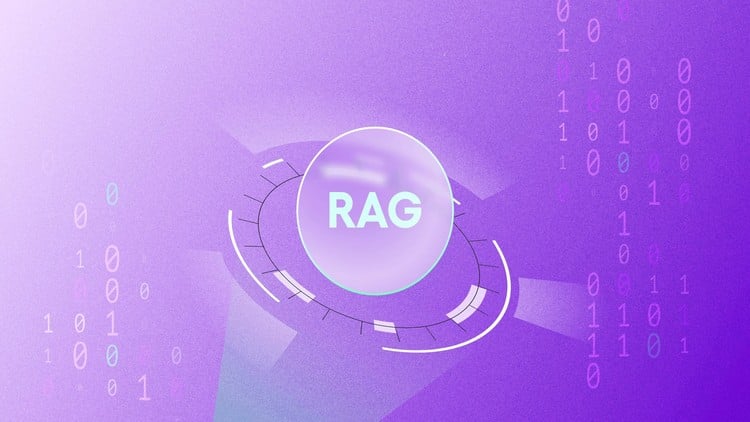
Learn the complete way to test RAG implementations. From functional to performance from Python to RAGAs and DeepEval
⏱️ Length: 5.2 total hours
⭐ 4.90/5 rating
👥 255 students
🔄 July 2025 update
Add-On Information:
Note➛ Make sure your 𝐔𝐝𝐞𝐦𝐲 cart has only this course you're going to enroll it now, Remove all other courses from the 𝐔𝐝𝐞𝐦𝐲 cart before Enrolling!
-
Course Overview
- This course offers an intensive, hands-on journey into the critical domain of testing Retrieval-Augmented Generation (RAG) systems. As LLM-powered applications become ubiquitous, ensuring their reliability, accuracy, and performance is paramount. This program provides a systematic methodology for evaluating RAG implementations, moving beyond basic functionality to deeply assess nuanced aspects like factual grounding, retrieval efficacy, and user-perceived quality. You will master the process of building robust testing pipelines using industry-standard tools.
- Explore how to create comprehensive test suites that rigorously cover the entire RAG lifecycle, from data retrieval to final response generation. The curriculum emphasizes practical application, guiding you through the construction of automated testing environments designed to identify weaknesses and validate improvements in your RAG applications. Equip yourself with the practical skills to implement rigorous quality assurance for sophisticated AI systems, ensuring they deliver consistent and trustworthy results in real-world scenarios.
-
Requirements / Prerequisites
- A foundational understanding of Python programming is essential, including basic syntax, data structures, and object-oriented concepts. While the course provides extensive practical code, a comfortable grasp of Python will significantly enhance your learning experience and engagement with hands-on exercises.
- Familiarity with general software testing or quality assurance principles will be beneficial, though not strictly required. The course is structured to introduce testing principles relevant to AI/ML applications, but prior exposure to test case design provides a helpful context.
- Basic knowledge of machine learning or artificial intelligence concepts is recommended. This aids in appreciating the intricacies of LLM applications and their unique testing challenges, though specific RAG architecture knowledge isn’t a prerequisite.
- A willingness to engage with complex technical concepts and a strong desire for hands-on application of advanced testing frameworks are key to succeeding in this comprehensive program.
-
Skills Covered / Tools Used
- Designing Comprehensive RAG Test Suites: Learn to conceptualize and structure rigorous test cases that evaluate RAG systems across various performance dimensions, ensuring robust operation under diverse conditions. This includes methodologies for creating representative test data and simulating real-world user interactions.
- Automated Evaluation Pipeline Development: Acquire the expertise to build and integrate automated testing workflows using Python, enabling continuous quality assessment of your RAG applications throughout their development lifecycle.
- Leveraging Ragas for Contextual Evaluation: Master the Ragas framework to meticulously assess the quality of information retrieval and its influence on generated responses. This involves configuring custom evaluators and interpreting detailed diagnostic reports.
- Implementing DeepEval for End-to-End Validation: Gain proficiency in using DeepEval to perform holistic evaluations of RAG outputs, focusing on aspects critical for user experience and system reliability, such as response coherence and adherence to factual information.
- Quantitative Assessment of RAG Performance: Develop skills in selecting, applying, and interpreting advanced quantitative metrics to precisely measure different facets of RAG system quality, facilitating data-driven improvements. This extends to understanding how to benchmark system performance against established baselines.
- Debugging and Performance Optimization through Testing: Utilize the insights gained from evaluation results to identify bottlenecks, debug issues within RAG pipelines, and iteratively refine system components for enhanced performance and accuracy.
- Integration of Testing into CI/CD Workflows: Explore strategies for incorporating automated RAG testing into continuous integration and continuous deployment pipelines, fostering a culture of quality assurance for AI-driven products.
- Python for Advanced Testing Scenarios: Extend your Python capabilities to script complex test scenarios, manage evaluation data, and customize testing frameworks to fit unique RAG application requirements.
-
Benefits / Outcomes
- Become a RAG Testing Expert: Emerge from the course with specialized expertise in designing, implementing, and analyzing tests for RAG systems, positioning you as a crucial asset in any team building LLM applications.
- Build Reliable LLM Applications: Gain the knowledge and tools necessary to ensure your RAG applications consistently deliver accurate, relevant, and trustworthy information, significantly reducing the risk of undesirable outputs.
- Accelerate AI Development Cycles: By mastering automated testing, you will be able to more rapidly iterate on RAG models and deployments, confident in the quality and performance of each update.
- Enhance System Transparency and Debuggability: Develop a clearer understanding of your RAG system’s strengths and weaknesses through systematic evaluation, making it easier to diagnose problems and implement targeted improvements.
- Contribute to Robust AI Solutions: Play a pivotal role in the development of high-quality, production-ready RAG systems that meet stringent performance and reliability standards in diverse industries.
- Elevate Your Technical Portfolio: Add a highly sought-after and cutting-edge skill set to your resume, demonstrating your capability in the rapidly evolving field of generative AI testing and quality assurance.
- Confidence in Deployment: Deploy RAG applications with greater assurance, knowing they have undergone thorough and systematic validation against a comprehensive suite of tests.
-
PROS
- Highly Relevant & In-Demand Skill: Addresses a critical and evolving need in the generative AI landscape, making your expertise immediately valuable.
- Practical, Hands-On Learning: Focuses on real-world implementation with industry-standard tools like Ragas and DeepEval, ensuring immediate applicability.
- Comprehensive Coverage: Explores both functional and performance aspects of RAG testing, offering a holistic view of quality assurance.
- Experienced Instructor & Peer Community: Benefit from a high-rated course and interaction opportunities, as indicated by the 4.90/5 rating and student count.
- Concise yet Impactful: Delivers significant learning in a focused 5.2 hours, ideal for busy professionals seeking specialized skills.
-
CONS
- The rapid evolution of LLM frameworks and testing methodologies may necessitate continuous learning beyond the course material.
Learning Tracks: English,Development,Software Testing
Found It Free? Share It Fast!